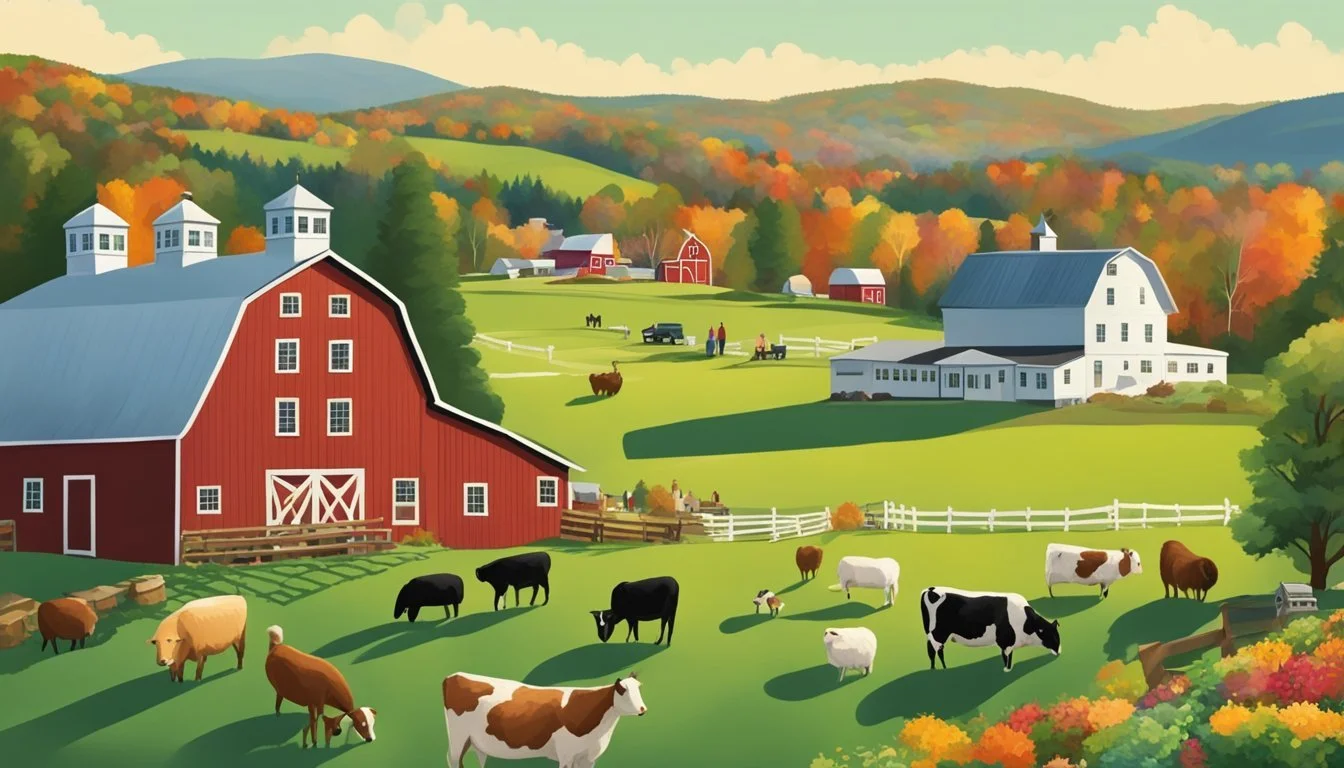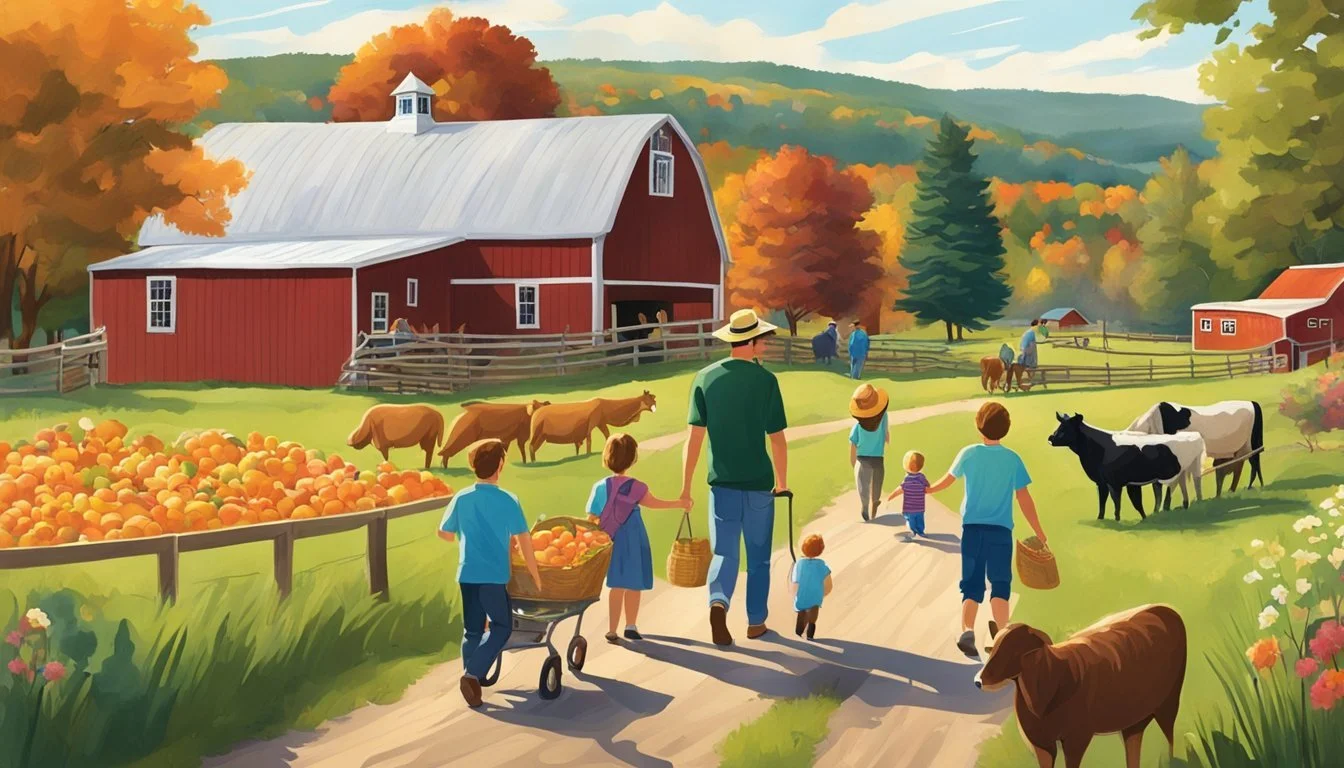Agritourism in Vermont
Embracing Rural Charm and Farm Fresh Experiences
Agritourism in Vermont represents a flourishing interface between agriculture and tourism that offers a unique opportunity for visitors to experience rural life and for farms to generate additional revenue. This symbiotic relationship benefits local economies while providing educational and recreational experiences for tourists. Vermont's diverse agritourism sector includes activities such as farm stays, educational tours, and direct sales of farm products, allowing visitors to immerse themselves in the state's rural heritage and pastoral beauty.
The state's legislative support, evident in Act 31 of 2021, acknowledges the inherent risks associated with farming activities and aims to shield farm operators from liability, provided they have properly informed participants of these risks. Such proactive measures by Vermont demonstrate a commitment to promoting agritourism as a sustainable avenue for preserving farming livelihoods and landscapes.
With initiatives like the declaration of August as Agritourism Month and the hosting of the International Workshop on Agritourism, Vermont has positioned itself as a leader in this sector. The growth and support of state-wide agritourism events such as Open Farm Week and the Maple Open House Weekend highlight the state's dedication to supporting farmers in harnessing the potential of agritourism as an integral part of their business model.
Understanding Agritourism
Agritourism in Vermont intertwines education and farm experiences to foster agricultural literacy and support local economies.
Historical Context
The concept of agritourism has evolved from its rudimentary roots of simply visiting a farm to purchase fresh produce. Vermont, known for its pastoral landscapes and robust agricultural heritage, has long recognized the value of connecting the public with agrarian life. It has transformed into an economic strategy that allows farms to flourish by integrating recreational and educational components into the agricultural experience. This multidimensional approach provides financial opportunities for farmers while preserving the state's rural charm.
Agritourism Definitions
Agritourism refers to the act of visiting a working farm or any agricultural, horticultural, or agribusiness operation for the purpose of enjoyment, education, or active involvement in the activities of the farm or operation.
Key characteristics of agritourism include:
Education: Visitors gain insight into farming processes, sustainability efforts, and the origin of their food.
Farm Experience: Guests partake in authentic farm activities, ranging from apple picking to on-farm workshops, which foster a deeper connection with the agricultural world.
These elements coalesce to define agritourism as a vital tool to enhance the visibility of farming practices, generate additional income streams for farmers, and provide educational experiences for the public.
The Agritourism Landscape in Vermont
Agritourism in Vermont, known as the Green Mountain State, provides visitors with a unique blend of educational and recreational experiences centered around farming life. This industry connects consumers directly with the state's rich agricultural heritage.
Key Destinations
Liberty Hill Farm: Located in Rochester, Vermont, Liberty Hill Farm offers guests an immersive farm stay experience. Visitors can participate in daily farm operations and enjoy the pastoral beauty of the region.
Cabot Creamery: Famous for its award-winning cheeses, Cabot Creamery is a cooperative of over 800 dairy farm families. Tours provide insight into cheese-making and the importance of agriculture to Vermont's economy.
Iconic Vermont Agritourism Experiences
Agritourism in this state delivers authentic experiences that highlight the connection between land and community.
Dairy Farm Visits: Interact with farm animals, learn about sustainable farming, and savor fresh dairy products right from the source.
Maple Sugaring Tours: Experience Vermont's maple sugaring process first-hand and taste the state's signature maple syrup.
Benefits of Agritourism
Agritourism in Vermont not only enhances the viability of farm businesses but also educates the public and enriches communities.
Economic Impact
The introduction of agritourism has a significant economic impact on Vermont’s agricultural sector. It provides farms with an additional income stream, potentially stabilizing farm finances and contributing to the overall economic health of the state. Farms can diversify their revenue through direct sales of produce, farm-to-table events, and other entertainment activities. This, in turn, injects more money into the local economies, supporting both the immediate community and the broader state financial framework.
Educational Value
Agritourism serves as a valuable educational resource. By inviting the public onto their farms, farmers can offer hands-on learning experiences that convey a deeper understanding of food production and sustainable agricultural practices. Visitors, especially those from more urban settings, gain insight into the origins of their food and the importance of agriculture to their daily lives.
Community and Cultural Benefits
Farms engaging in agritourism strengthen community ties and celebrate Vermont's rich agricultural heritage. These activities often include community events like agricultural festivals, which foster a sense of belonging and pride in local traditions. Through supporting local farms and events, residents and visitors alike contribute to the preservation of the cultural fabric that is uniquely Vermont's.
Planning Your Agritourism Adventure
Embarking on an agritourism adventure in Vermont offers visitors a chance to immerse themselves in the state's rich agricultural heritage. From scenic farm stays to hands-on educational experiences, there's a variety of activities to choose from based on individual interests and desires.
Choosing the Right Farm Stay
Farm stays in Vermont are as diverse as the landscape itself, providing a spectrum of accommodations ranging from rustic to luxurious. Guests should consider what type of farm experience they are seeking—whether it's participating in daily farm chores, enjoying farm-to-table meals, or simply relaxing in a pastoral setting. Some farms offer bed & breakfast services, allowing a closer look at rural living and the state's thriving agricultural community.
Vermont’s Farm Stands and Pick-Your-Own Farms
Farmers across Vermont proudly offer farm stands where visitors can purchase fresh, local produce and artisanal products. To truly engage with Vermont's agrarian roots, visitors can head to pick-your-own farms, where they can harvest their own fruits and vegetables. This hands-on experience not only connects them with the source of their food but also supports local growers.
Unique Farm-Based Classes and Workshops
Many Vermont farms expand their offerings with classes and workshops, fostering a deeper understanding of agricultural practices. Visitors can learn a variety of skills from cheese making to cider brewing, often taught by local experts or the farmers themselves. Participating in these educational sessions provides insight into the innovative spirit that defines Vermont's farming culture.
By exploring these agritourism components, travelers can craft an enriching Vermont adventure that aligns with their interests and supports the state's agricultural economy.
Involved in the Trade
In Vermont, agritourism has become an intricate part of the agricultural economy, presenting new opportunities for both farmers and agricultural service providers, while also necessitating an understanding of applicable regulations and resources available.
For Farmers and Landowners
Farmers and landowners are at the forefront of Vermont’s agritourism sector. They have the unique opportunity to diversify their income by transforming part of their operations into destinations for education, recreation, and the direct sale of farm products. The state’s legislation, Act 31, which came into effect on July 1, 2021, recognizes the "inherent risks" of agritourism and allows farmers to mitigate liabilities by providing adequate warnings to consumers.
Here's what farmers need to consider:
Regulations: Comprehension of Vermont's agricultural regulations is essential to ensure compliance and limit liability.
Permits: Depending on the activities offered, additional permits may be required.
Resources: Various state-led initiatives and workshops provide support and guidance for implementing agritourism on their land.
For Agricultural Service Providers
Agricultural service providers play a crucial role in supporting the agritourism trade by offering specialized services, guidance, and advocacy for the industry. They help bridge the gap between agritourism pursuits and regulatory adherence, ensuring a seamless integration of tourism into farming businesses.
Key points for service providers:
Educational Resources: They provide farmers with tools and information on best practices in agritourism, ranging from safety protocols to marketing strategies.
Networking: Service providers facilitate connections, creating a network of agritourism practitioners to foster industry growth.
Advocacy: They represent the interests of the agritourism sector at various levels, from local communities to state legislatures, promoting policy that supports the trade.
Building a Sustainable Agritourism Enterprise
Building a sustainable agritourism enterprise in Vermont integrates eco-friendly farming practices with effective marketing strategies. A focus on environmental stewardship and brand development is central to success.
Promoting Eco-Friendly Practices
One essential aspect of creating a sustainable agritourism enterprise is the implementation of eco-friendly farming practices. This includes:
Renewable Energy Use: Installing solar panels or other renewable energy sources reduces the carbon footprint.
Water Conservation: Employing rainwater harvesting and drip irrigation to minimize water usage.
Composting and Recycling: Establishing a robust system for organic waste contributes to soil health and reduces landfill use.
Adopting these practices not only preserves the pristine Vermont countryside but also appeals to environmentally conscious visitors.
Developing a Green Agritourism Brand
A green agritourism brand effectively communicates the farm's commitment to sustainability. Key marketing elements involve:
Consistent Messaging: Using promotional materials that highlight sustainable values and practices.
Education: Offering tours and workshops that engage visitors in the enterprise’s green initiatives.
Through a focused brand strategy, farms can differentiate themselves in the market, attracting patrons who prioritize environmental responsibility.
Regulatory Framework
In Vermont, agritourism operators must navigate a complex set of zoning and agricultural regulations to ensure compliance. The state has established clear guidelines to mitigate risk and promote sustainable practices within the sector.
Understanding Zoning and Permits
Zoning Laws: In Vermont, agritourism activities are subject to local zoning laws which determine the types of activities that can occur on agricultural land. Operators must:
Check the local zoning regulations specific to their municipality.
Apply for special use permits if the intended agritourism activities are not permitted by right.
Permit Requirements: Depending on the scale and scope of agritourism activities, operators may require different permits. Essential permits include:
Building permits for new structures.
Health department permits for public events.
Operators should refer to Vermont’s Agency of Agriculture Food and Markets for detailed checklists that guide through the permit process.
Navigating Agricultural Regulations
Agritourism Legislation: The Vermont Act 31, effective from July 1, 2021, helps limit liability for agritourism by recognizing the inherent risks involved and delegating those risks to informed consumers.
Compliance Checklists: To comply with agricultural regulations, operators should:
Utilize the state-provided Regulatory Checklist (PDF).
Contact Vermont Fresh Network or other points of contact for assistance.
Information on licenses required for different agritourism scenarios is available through state resources, assisting in simplifying the compliance process.
Engaging with the Agritourism Community
The Vermont agritourism scene thrives on community engagement and collaboration. Establishing robust networks and participating in key events are crucial for anyone looking to be part of this vibrant sector.
Networking and Building Connections
Networking within the agritourism community is vital for fostering relationships and ensuring the longevity of agritourism ventures. These connections provide a diverse array of opportunities for farmers and agritourism professionals to exchange knowledge, resources, and support.
Community Involvement: Farm operators interact with local communities to share agricultural practices and insights.
Collaborative Initiatives: Joining forces with local tourism boards or agritourism associations enhances visibility and promotes a unified approach to development.
Attending Events and Workshops like the International Workshop on Agritourism
Events and workshops play an instrumental role in the continuous development of the agritourism community. The International Workshop on Agritourism exemplifies this, offering a platform where global knowledge on agritourism can converge and be disseminated.
Information Sessions: Participants have access to the latest agritourism trends and data.
Networking Opportunities: Facilitates international connections and collaboration, broadening the scope for local agritourism initiatives.
Future of Agritourism in Vermont
The agritourism industry in Vermont continues to evolve with innovations and trends that promise growth and diversification. Revenue generation and tourist engagement remain central as farms adapt to changing markets and consumer interests.
Innovations in Farming and Tourism
In recent years, Vermont's farms have expanded their tourism activities to include more than just traditional visits. Innovative approaches in blending agriculture with recreation and education are taking root. Examples include farms integrating digital technology to offer virtual tours and interactive experiences that cater to a technologically-savvy visitor base. Additionally, farms are introducing unique accommodations, such as luxury yurts and eco-cabins, to encourage longer stays. The use of renewable energy and sustainable practices is not only reducing the carbon footprint but is also attracting eco-conscious tourists.
Industry Outlook and Trends
The agritourism sector's industry outlook appears robust as consumer demand for authentic and local experiences grows. Trends indicate an increase in partnerships between farmers and the culinary sector, facilitating farm-to-table events and boosting the local economy. The emphasis on direct sales, through farmers' markets and on-site farm stands, supports revenue streams for Vermont’s agricultural community. Educational programs aimed at both adults and children are also expanding, highlighting the 'farm experience' and creating deeper connections between consumers and their food sources. With these developments, agritourism in Vermont is positioned to thrive and contribute significantly to the state's tourism economy.
Support and Resources
Vermont offers a wealth of resources and support mechanisms for agritourism providers. These are designed to enhance the economic impact of farms by transforming them into flourishing hubs for recreation and education, while promoting the sale of farm products.
Finding Information and Support
Farmers in Vermont have access to comprehensive information and support from a variety of institutions, including state agencies and educational entities. The Vermont Agency of Agriculture, Food & Markets partners with diverse organizations to support agritourism and provide crucial guidance. They aim to assist farmers in preparing for agritourism activities, assessing current operations, and accessing a network of support resources.
Networking: Connections with other agritourism operators
Planning Assistance: Guidance on starting and managing agritourism activities
Regulatory Insight: Information on safety, liability, and regulations
Promotional and Marketing Resources
Marketing resources are vital for agritourism success. The Vermont Tourism Research Center, along with other outlets, provides farmers with tools to effectively market their experiences.
Marketing Strategies: How to showcase farm experiences and attract visitors
Promotional Materials: Guidelines to create engaging materials
Online Presence: Best practices for utilizing digital platforms to reach potential visitors
These resources focus on both traditional and digital media, ensuring that agritourism businesses can connect with their target audience to promote activities ranging from direct farm marketing to animal interactions.
Conclusion
Agritourism in Vermont has established itself as a pivotal component of the state's economy, contributing significantly to the preservation of its working landscape. This model serves as a bridge between rural and urban communities, providing a platform for recreation and education.
Economic Impact: The growth of agritourism has injected vital revenue into Vermont's agricultural sector. Farms have diversified income streams through on-farm sales and agritourism activities, which support local economies and contribute to farm sustainability.
Health and Well-being: Agritourism offers visitors the unique opportunity to engage in a healthy lifestyle. By connecting with food sources and nature, individuals gain an appreciation for fresh, local produce and the benefits of outdoor activities.
Education Value: The hands-on experiences afforded by Vermont agritourism foster a deeper understanding of farming practices and sustainable agriculture. Visitors leave with enriched knowledge of where their food comes from and the importance of supporting local farmers.
Environmental Benefits: Agritourism supports the stewardship of Vermont's working landscapes. It incentivizes the maintenance of agricultural land, ensuring that these areas remain undeveloped and ecologically healthy.
As agritourism continues to flourish, Vermont stands as a role model for other regions. Their approach to limiting liability, while providing consumer warning, exemplifies a balance between visitor responsibility and farm protection. The state's agritourism sector not only promises a robust future for Vermont's farms but also fortifies the bond between consumers and the agricultural community.











